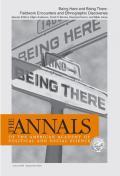
As students of culture, ethnographers must have curiosity, openness, and humility - three traits vital for “getting with”people. But how do ethnographers go about developing relationships with people in the field? And how do they learn from these people so they can conduct a systematic study of the culture?
These key questions can best be answered by sharing field experiences among a diverse group of ethnographers. Yet researchers often become so embedded in the extensive data collections, analysis, and writing that the opportunity rarely occurs to share experiences, fieldwork, and current projects. Leading ethnographers recognized the need for a forum where information could be exchanged.
The major ethnography conference (held at the University of Pennsylvania in November 2003) presented by established ethnographers along with graduate students the chance to participate in an exciting format where works-in-progress could be shared. This intimate setting built a bridge to take ethnography into the future while reestablishing ties to scholarly roots.
Using the Chicago School and its emphasis on “bringing back the news” from unknown or misknown social worlds as a foundation, these conferences created a buzz where information was freely shared and ethnographers connected. The University of Pennsylvania conference became the springboard for the articles in this special volume of The ANNALS.
Contemporary ethnography is much too large, too diverse, too contentious to be represented in its entirety in a single collection of articles. However, this weighty volume represents a distinctive approach to ethnography that seeks to engage, reassert, and reassess three recurring themes found in classic Chicago-style fieldwork:
I. The focus on discovery, rather than on theory or method
II. “Loyalty to the phenomenon” - emphasizing what people are actually doing versus what theory suggests people are doing
III. The collection of original data, as well as the collection of ethnographic data in original ways
This unique volume offers the rare chance to learn what ethnographers are doing in the field as well as the different approaches taken and styles used in conducting fieldwork. It also provides poignant insight for public policy students and practitioners.
The articles included in this volume reflect a wide range of stories and researchers from around the country and around the world. Taken together they provide the big picture of the challenges and boons of fieldwork and examined experiences.